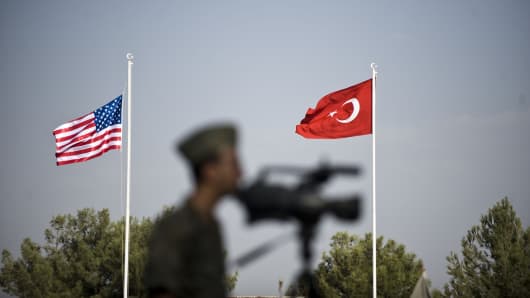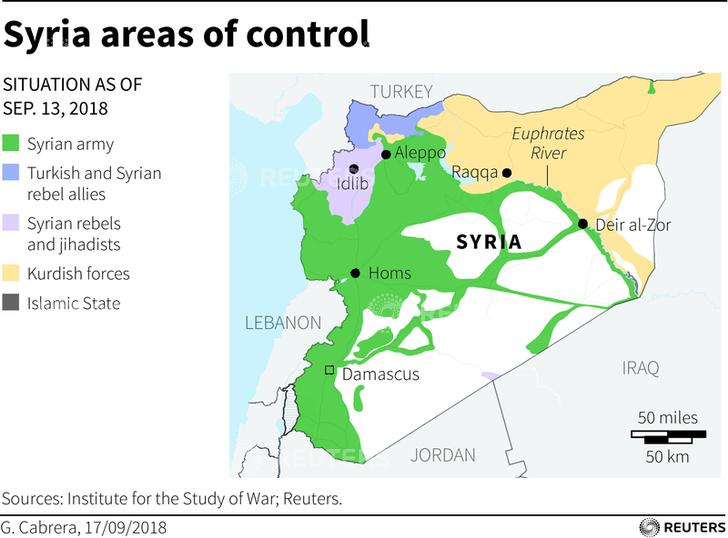
Kerem Kocalar | Anadolu Agency | Getty Images
Turkish and US flags are seen during a ceremony as their duty period finished on September 15, 2015 at the Patriot missiles deployment in Gaziantep, Turkey.
President Donald Trump’s administration may have just handed Turkey’s President Recep Erdogan another win.
Less than a week after Trump’s abrupt decision to withdraw all U.S. troops from Syria, Turkey’s foreign minister said Tuesday the U.S. has agreed to complete its previously established “roadmap” to remove all Kurdish militia fighters from the Northern Syrian town of Manbij before U.S. forces clear out.
Ankara has been waiting for this guarantee for a while, complaining since its agreement in June that Washington was dragging its feet on the deal. The U.S. has been supporting the Syria-based Kurdish People’s Protection Unit (YPG) as part of the Syrian Democratic Forces fighting the Islamic State (IS), but the Turks view those fighting Kurds as linked to a Kurdish terrorist group that’s carried out a decades-long insurgency against the Turkish state.
Last week, Erdogan threatened to attack Manbij to “cleanse” it of the YPG, whom he called terrorists — a move the Pentagon has called “unacceptable.” The U.S. withdrawal is reportedly expected to begin within weeks.
At the time of this publication, the Pentagon had not yet responded to a CNBC request for comment sent Tuesday.
Turkey also plans to cross east of the Euphrates River in Northern Syria “as soon as possible,” Turkish Foreign Minister Mevlut Cavusoglu reportedly told local media Tuesday, without elaborating. Manbij is west of the Euphrates, but Kurdish forces control a wide swath of land on the eastern side of the river.
With the impending departure of U.S. troops from Syria, Turkey will have vast sway to push out Kurdish forces, who now say the feel they are being abandoned by their American partners. Turkish troops have amassed along the Syrian-Turkish border and Turkish-backed Syrian rebels are grouping around Manbij. The Kurds have reportedly begun digging ditches and trenches in anticipation of the offensive, prompting Turkish Defense Minister Hulusi Akar to say Thursday, “they will be buried in their ditches when the time comes.”

Security experts fear that in turning their focus toward fighting the Turks, the YPG will have to divert resources and attention from the fight against IS, which Pentagon officials say is far from won. Ankara has so far held back on its threatened offensive due to the U.S. troop presence.
“A Turkish incursion would force many YPG fighters to shift their efforts away from fighting IS, risking a reversal of recent progress,” Turkey expert Soner Cagaptay and former Senate Foreign Relations Committee member Dana Stroul wrote in a brief for The Washington Institute for Near East Policy.
And with U.S. forces absent and unable to keep their local coalition focused on finishing the fight, “counterterrorism in east Syria would effectively be outsourced to Turkey and its local partners, or even to the Assad regime and its backers,” they wrote.
‘IS 2.0’
Turkey, an adversary of the Assad regime, has vowed to take on the IS fight from the U.S. and prevent the extremist group from regaining territory, with a spokesman for Erdogan saying Monday, “As part of the global coalition to defeat ISIS, we would like to express again that we will not allow such a thing to happen on Syrian soil, Iraqi soil or Turkish soil.”
The “Manbij roadmap” is expected to see all Kurdish militia forces moved out of Manbij and local Arab councils established to run the town currently under YPG control. Human rights groups and some Arabs in Syria’s north have accused the YPG of kidnapping, torture and ethnic cleansing against non-Kurdish groups. Meanwhile, many Kurds have expressed a willingness to accept Syrian President Bashar Assad’s return to power over the northern areas they hold in order to repel Turkey, which backs rebels fighting Assad.
Play Video

This “Assad option,” Stroul and Cagaptay wrote, “would ensure renewed Sunni Arab support for violent extremist groups, likely leading to ‘IS 2.0.'” Yet continued YPG control in the east is “not sustainable either,” they added, due to tensions between the Kurds and majority-Arab communities in Northern Syria in addition to Turkey’s border security concerns.
In what may be yet another positive stateside development for Ankara, its foreign minister said Tuesday that Turkish executive Hakan Atilla, sentenced in the U.S. for violating Iran sanctions, may be returned to Turkey. The executive’s employer, Turkey’s Halkbank, has been under threat of potential U.S. Treasury fines as a result, but a recent warming in relations between the two NATO allies is increasing chances that the lender will get a pass.
Ankara and Washington have seen significant turbulence in their relationship over the past year amid disagreements over Syria, the Turkish detention of an American pastor, relations with Russia, Iran sanctions and trade tariff threats.
